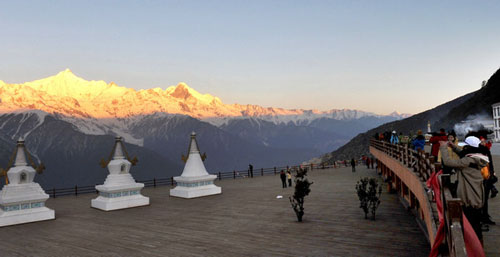
The top half of the Yulong Snow Mountain basks in the sun as visitors use telescopes to view the southernmost snow-capped mountain in the Northern Hemisphere, in Yunnan province on March 12. Lin Yiguang / Xinhua
A combination of climate change and booming tourism could cause famous mountain spots in Southwest China's Yunnan province to lose their snow, authorities and experts have warned.
Rising temperatures in recent years have steadily pushed the snow line on Meili Snow Mountain in the Diqing Tibetan autonomous prefecture to higher altitudes.
Mingyong glacier, one of 13 glaciers on the snow-capped mountain, retreated about 50 meters between 1994 and 2002, according to the Deqin county meteorological bureau.
By 2006, the glacier had melted to 200 meters, and it is still shrinking, Spring City Evening in Kunming reported on Sept 27, citing official figures.
Due to abnormal weather conditions, Meili Mountain has received less than 50 centimeters of snow annually in recent years, the report said.
"I had always hoped to visit Meili Mountain, which had a splendid snow-covered landscape as I saw on television," said Zhang Ling, a 31-year-old tourist from Shenyang, Liaoning province.
"My dream came true when I paid a visit last week. But I was pretty disappointed since it was hard to see snow on the hillside and only some covered the mountaintop," she said. "The landscape is different from what I had expected."
Glaciers on Yulong Snow Mountain in Lijiang have shrunk over the past 30 years due to global warming and frequent droughts, said He Yuanqing, director of Yulong Snow Mountain Observatory of Cold and Arid Region Environmental and Engineering Research Institute, Chinese Academy of Sciences.
Over the last 10 years, glaciers on the mountain have shrunk 20 to 30 meters annually, he said.
An increase in visitors has also put more pressure on the environmentally sensitive mountain glaciers.
Meili Snow Mountain attracted nearly 22,000 tourists during the eight-day Golden Week holiday for the Mid-Autumn Festival and National Day that ended on Sunday, a 10 percent year-on-year increase.
The number of tourists to Meili Snow Mountain peaked in 2007, hitting 600,000, said Li Qiang, an official in charge of the mountain.
"A lot of garbage left by tourists on the mountain cannot be cleaned up in a timely manner, which poses a great environmental threat," he said.
Huge amounts of carbon dioxide given off by people have accelerated the loss of glaciers, said Wang Ping, a professor of geographic sciences at Yunnan Normal University.
Analysts say glaciers play an important role in storing winter rainfall, regulating water supply through the year, reducing floods and shaping the land.
There is no denying that glaciers across the world are receding faster than ever in places such as in Yunnan and the Qinghai-Tibet Plateau, Wang said.
"Glacier melting may not stop as a result of natural causes. But such a trend can be slowed down by reducing the impact of human activities," he said.
A monitor program on glacial changes will be launched on Meili Snow Mountain in November and the number of people visiting the mountain will be restricted to protect to the glaciers, said Li Qiang.

Copyright ©1999-2011 Chinanews.com. All rights reserved.
Reproduction in whole or in part without permission is prohibited.